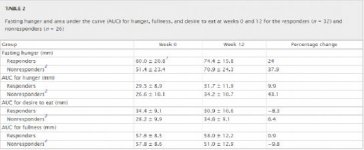MrRippedZilla
Retired
- Joined
- Mar 3, 2014
- Messages
- 1,706
- Reaction score
- 3,522
- Points
- 153
Full paper: Dual-process action of exercise on appetite control: increase in orexigenic drive but improvement in meal-induced satiety
BACKGROUND:
Exercise could contribute to weight loss by altering the sensitivity of the appetite regulatory system.
OBJECTIVE:
The aim of this study was to assess the effects of 12 wk of mandatory exercise on appetite control.
DESIGN:
58 overweight and obese men and women [mean (+/-SD) body mass index (in kg/m(2)) = 31.8 +/- 4.5, age = 39.6 +/- 9.8 y, and maximal oxygen intake = 29.1 +/- 5.7 mL . kg(-1) . min(-1)] completed 12 wk of supervised exercise in the laboratory.
The exercise sessions were designed to expend 2500 kcal/wk.
Subjective appetite sensations and the satiating efficiency of a fixed breakfast were compared at baseline (week 0) and at week 12.
An Electronic Appetite Rating System was used to measure subjective appetite sensations immediately before and after the fixed breakfast in the immediate postprandial period and across the whole day.
The satiety quotient of the breakfast was determined by calculating the change in appetite scores relative to the breakfast's energy content.
RESULTS:
Despite large variability, there was a significant reduction in mean body weight (3.2 +/- 3.6 kg), fat mass (3.2 +/- 2.2 kg), and waist circumference (5.0 +/- 3.2 cm) after 12 wk.
The analysis showed that a reduction in body weight and body composition was accompanied by an increase in fasting hunger and in average hunger across the day (P < 0.0001).
Paradoxically, the immediate and delayed satiety quotient of the breakfast also increased significantly (P < 0.05).
CONCLUSIONS:
These data show that the effect of exercise on appetite regulation involves at least 2 processes: an increase in the overall (orexigenic) drive to eat and a concomitant increase in the satiating efficiency of a fixed meal.
Methodology
Anything related to appetite regulation & preventing weight regain intrigues me greatly due to the fact that I primarily deal with clients who have to stay in great shape year round. Cardio, and increasing physical activity levels in general, have been shown numerous times in the literature to be a vital component to this and hence my interest in this paper.
The researchers did a pretty damn good job at controlling most of the variables here by having all the cardio sessions be performed in the lab, with a target of burning 2500cals per week, in order to prevent self-reporting errors that are far too common.
When I say cardio, I mean 70% max heart rate (MHR) with the duration/intensity recalculated every 4 weeks in order to take into account weight & VO2 max changes (both impact MHR).
Breakfast was also provided by the lab in order to get an accurate measurement for the satiety quotient (SQ), which reflects the capacity of the energy consumed to modulate postprandial sensations by looking at both immediate (satiation) and delayed (satiety) effects of a fixed meal.
As for the weak points, well, we don't have any resistance training and the subjects were all obese - both key variables that play a major role in appetite regulation ad therefore this study becomes pretty limited in its applicability.
I also would've liked to have seen a no-cardio group where the deficit of 2500cals per week was diet-induced instead. This would've given us more information on the impact of cardio specifically on the desire to eat, satiation, satiety, etc. I have my own opinions on this topic, based on data & experience, but I'll save them for another time.
Results & discussion
The researchers anticipated in advanced that there would be both responders and nonresponders to this cardio-only approach, which was indeed the case with 32 subjects classified as responders and 26 as nonresponders, and were smart enough to conduct a separate analysis taking this into account.

- These body comp measurements were taken via bodpod and we can see the big gap between the responders & nonresponders particularly with regards to fat loss (15.3% vs 4.7%).

- As you can see, the hunger rating stayed about the same for the responders while significantly increasing week-by-week in the nonreponders.

- Data showing the fasting hunger, hunger through out the day, fullness, and desire to eat levels for the responders and nonresponders.
- Fasting hunger up 24% in responders & 38% in nonresponders, hunger across the day up 9.9 & 43.1%, desire to eat down 8.3% and up 6.4%, Fullness up 0.9% and down 9.8%.
The immediate & subsequent SQs for both the responsive & non-responsive groups can be found here but the gist of it was that the fixed breakfast had a stronger hunger suppressing effect as the weeks went by for both groups and there was no significant differences between the sexes when it came to appetite regulation.
So, cardio-induced weight loss leads to 1) An increase in fasted & daily hunger for nonresponders and 2) improved satiation & satiety independent of weight loss (for both responders & nonresponders), which confirms the acute anorexic effect of cardio. These are obviously pretty contradictory effects on appetite (feeling hungrier but also becoming fuller quicker) and the researchers describe this dual process as such:
"In essence, these are 2 different measures - one reflects the homeostatic energy state after a period of reduced body energy (exercise energy expenditure or food deprivation), and the other reflects the interaction between the physiologic system and the physiologic action of food on satiety signalling...The exercise regimen apparently raised the sensitivity of the physiologic signaling system, which allowed the same amount of food to realize a greater suppression of hunger."
It is interesting to see this increased sensitivity for appetite regulation via contradictory mechanisms of action (MOAs).
This paper didn't have the data required to pinpoint what exactly these MOAs were, as conceded by the researchers, but it's a good guess that it involves certain peptides that are actively involved in short & long term satiety signalling within the neuroendocrine system. To support this hypothesis there is data showing Ghrelin (the main hunger hormone) to be suppressed after lifting and peptide YY (a weak satiety hormone) to be increased after cardio, at least in folks with a normal circadian rhythm (this is another key factor behind appetite regulation).
However, the multi-factorial nature of appetite regulation makes it likely that there is no singular MOA at work.
Summary
Cardio is not equally effective for everyone as the primary method of fat loss
If your one of those people, like me, that finds their hunger levels increasing due to cardio then I would recommend cutting back because the acute anorexic effect will NOT counteract the chronic orexigenic one.
Appetite regulation is an incredibly complex, and flexible, signalling system.
Considering it would take a wide variety of drugs to to target each individual signal, it would be foolish to assume something like cardio will automatically help keep everyone fuller for longer during dieting. Or that it is something everyone needs to do when dieting for that matter.
BACKGROUND:
Exercise could contribute to weight loss by altering the sensitivity of the appetite regulatory system.
OBJECTIVE:
The aim of this study was to assess the effects of 12 wk of mandatory exercise on appetite control.
DESIGN:
58 overweight and obese men and women [mean (+/-SD) body mass index (in kg/m(2)) = 31.8 +/- 4.5, age = 39.6 +/- 9.8 y, and maximal oxygen intake = 29.1 +/- 5.7 mL . kg(-1) . min(-1)] completed 12 wk of supervised exercise in the laboratory.
The exercise sessions were designed to expend 2500 kcal/wk.
Subjective appetite sensations and the satiating efficiency of a fixed breakfast were compared at baseline (week 0) and at week 12.
An Electronic Appetite Rating System was used to measure subjective appetite sensations immediately before and after the fixed breakfast in the immediate postprandial period and across the whole day.
The satiety quotient of the breakfast was determined by calculating the change in appetite scores relative to the breakfast's energy content.
RESULTS:
Despite large variability, there was a significant reduction in mean body weight (3.2 +/- 3.6 kg), fat mass (3.2 +/- 2.2 kg), and waist circumference (5.0 +/- 3.2 cm) after 12 wk.
The analysis showed that a reduction in body weight and body composition was accompanied by an increase in fasting hunger and in average hunger across the day (P < 0.0001).
Paradoxically, the immediate and delayed satiety quotient of the breakfast also increased significantly (P < 0.05).
CONCLUSIONS:
These data show that the effect of exercise on appetite regulation involves at least 2 processes: an increase in the overall (orexigenic) drive to eat and a concomitant increase in the satiating efficiency of a fixed meal.
Methodology
Anything related to appetite regulation & preventing weight regain intrigues me greatly due to the fact that I primarily deal with clients who have to stay in great shape year round. Cardio, and increasing physical activity levels in general, have been shown numerous times in the literature to be a vital component to this and hence my interest in this paper.
The researchers did a pretty damn good job at controlling most of the variables here by having all the cardio sessions be performed in the lab, with a target of burning 2500cals per week, in order to prevent self-reporting errors that are far too common.
When I say cardio, I mean 70% max heart rate (MHR) with the duration/intensity recalculated every 4 weeks in order to take into account weight & VO2 max changes (both impact MHR).
Breakfast was also provided by the lab in order to get an accurate measurement for the satiety quotient (SQ), which reflects the capacity of the energy consumed to modulate postprandial sensations by looking at both immediate (satiation) and delayed (satiety) effects of a fixed meal.
As for the weak points, well, we don't have any resistance training and the subjects were all obese - both key variables that play a major role in appetite regulation ad therefore this study becomes pretty limited in its applicability.
I also would've liked to have seen a no-cardio group where the deficit of 2500cals per week was diet-induced instead. This would've given us more information on the impact of cardio specifically on the desire to eat, satiation, satiety, etc. I have my own opinions on this topic, based on data & experience, but I'll save them for another time.
Results & discussion
The researchers anticipated in advanced that there would be both responders and nonresponders to this cardio-only approach, which was indeed the case with 32 subjects classified as responders and 26 as nonresponders, and were smart enough to conduct a separate analysis taking this into account.

- These body comp measurements were taken via bodpod and we can see the big gap between the responders & nonresponders particularly with regards to fat loss (15.3% vs 4.7%).

- As you can see, the hunger rating stayed about the same for the responders while significantly increasing week-by-week in the nonreponders.

- Data showing the fasting hunger, hunger through out the day, fullness, and desire to eat levels for the responders and nonresponders.
- Fasting hunger up 24% in responders & 38% in nonresponders, hunger across the day up 9.9 & 43.1%, desire to eat down 8.3% and up 6.4%, Fullness up 0.9% and down 9.8%.
The immediate & subsequent SQs for both the responsive & non-responsive groups can be found here but the gist of it was that the fixed breakfast had a stronger hunger suppressing effect as the weeks went by for both groups and there was no significant differences between the sexes when it came to appetite regulation.
So, cardio-induced weight loss leads to 1) An increase in fasted & daily hunger for nonresponders and 2) improved satiation & satiety independent of weight loss (for both responders & nonresponders), which confirms the acute anorexic effect of cardio. These are obviously pretty contradictory effects on appetite (feeling hungrier but also becoming fuller quicker) and the researchers describe this dual process as such:
"In essence, these are 2 different measures - one reflects the homeostatic energy state after a period of reduced body energy (exercise energy expenditure or food deprivation), and the other reflects the interaction between the physiologic system and the physiologic action of food on satiety signalling...The exercise regimen apparently raised the sensitivity of the physiologic signaling system, which allowed the same amount of food to realize a greater suppression of hunger."
It is interesting to see this increased sensitivity for appetite regulation via contradictory mechanisms of action (MOAs).
This paper didn't have the data required to pinpoint what exactly these MOAs were, as conceded by the researchers, but it's a good guess that it involves certain peptides that are actively involved in short & long term satiety signalling within the neuroendocrine system. To support this hypothesis there is data showing Ghrelin (the main hunger hormone) to be suppressed after lifting and peptide YY (a weak satiety hormone) to be increased after cardio, at least in folks with a normal circadian rhythm (this is another key factor behind appetite regulation).
However, the multi-factorial nature of appetite regulation makes it likely that there is no singular MOA at work.
Summary
Cardio is not equally effective for everyone as the primary method of fat loss
If your one of those people, like me, that finds their hunger levels increasing due to cardio then I would recommend cutting back because the acute anorexic effect will NOT counteract the chronic orexigenic one.
Appetite regulation is an incredibly complex, and flexible, signalling system.
Considering it would take a wide variety of drugs to to target each individual signal, it would be foolish to assume something like cardio will automatically help keep everyone fuller for longer during dieting. Or that it is something everyone needs to do when dieting for that matter.
Last edited:










